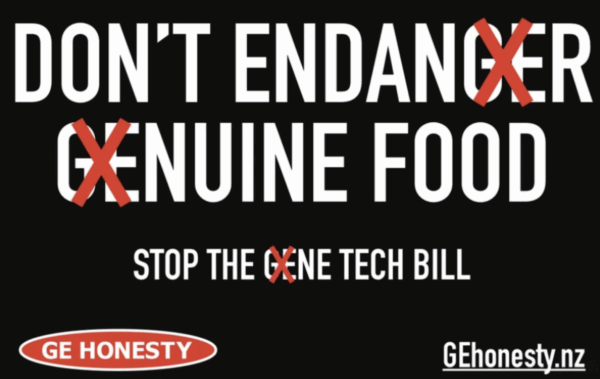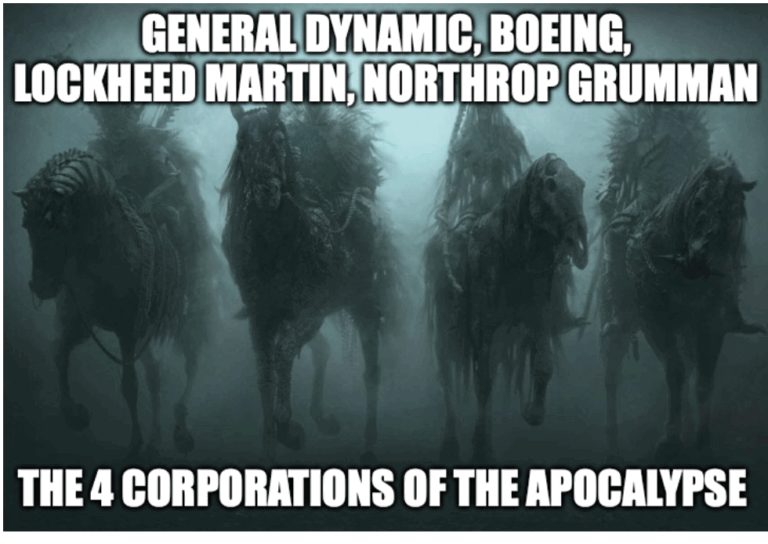GUEST BLOG: Jon Carapiet – High noon for the Gene Technology Bill. Can it be stopped?

Nationwide protests on Saturday 29th November to stop the Gene Technology Bill come a year after the Bill was introduced.
Right from the start of this Bill it was clear there was something very dodgy going on.
When New Zealand’s leading export industries (you know the ones …Dairy NZ, Beef & Lamb etc.), urgently sought more time to engage with stakeholders, they were told no by the chair of the select committee.
There was to be no time to stop, consult or engage.
That seems to still be the intention. Many people are still just hearing about the Bill with no debate of the issues on TV or radio. The only panel debate on the Bill available online was recently held at Lincoln University by Future Farmers – for just one hour.
There has been no community engagement, participation of Maori or multi-sector conversation that could have navigated a path towards a national Food Strategy for Brand New Zealand. Even government officials at MFAT are worried about the threat to GE-free exports.
Instead, the Bill had been written by the biotechnology industry, for the biotechnology industry. And for them alone.
The select committee hearings ran like clockwork, managing and then ignoring most of the submissions.
Ministerial documents released under the OIA and the Regulatory Impact Statement, reveal the process was jacked up. The analysis by Physicians and Scientists for Global Responsibility (PSGR NZ) is revealing, and they too call for the Bill to be stopped.
Their analysis shows that the Bill was so rushed that there was no time for officials to undertake an economic analysis. That fact alone should be reason enough to stop the Bill.
The global market for Non-GMO food continues to grow, especially in India and China.
The independent report by economists at NZIER signals that there is a multi billion dollar opportunity offered by protecting New Zealand’s GE-free production.
Officials creating the Gene Tech Bill appear to have been directed to take away regional powers from Councils that had established GE-free zones to protect growers and ratepayers from exposure to costs.
As if to reinforce the myth that gene technology had been banned, the inconvenient truth of decades of failed field trials of GM animals by AgResearch ‘disappeared’ so not even the select committee knew they had even existed. (They don’t exist any more as all the GE animals have been terminated, and the story buried).
The Bill has no liability provisions on the users of the technology, leaving farmers wondering who pays for compensation if their crop is contaminated. Biotech companies experimenting in New Zealand have failed before, leaving the New Zealand public to pay for clean up as happened with PPL’s thousands of GE sheep which had to be destroyed.
Officials removed protections such as the Precautionary Principle and were told to ignore the option of amending the current Hazardous Substances and New Organisms (HSNO) Act. Many people consider the HSNO Act has served us well, ensuring we have avoided the problems seen with GMOs overseas. There has been no ban on GMOs, but we have had strict rules that industry propose to remove, and there is a strong market preference for GE-free food that continues to this day.
Indeed, taking away the consumer right to know if food is GE has become part of the biotechnology industry strategy.
Seperate from the Bill, food authority FSANZ have been redefining Gene Edited foods under Proposal P1055 so they don’t have to be labelled and people won’t know.
Even though every measure of the market in different countries, shows people want labelling of Gene Edited foods.
The EU Court of Justice has come out against the industry ‘confusion marketing;’ strategy and said clearly that gene edited products are GMOs however the industry tries to spin it, and consumers should have the right to know.
In an open letter – European food companies and supermarkets are backing their customers for tracing and labelling of products of “New Breeding Techniques’, against the biotech lobby.
New Zealand supermarkets Woolworths and Foodstuffs have been silent on the Bill. But they are now in the front line and asked to support their customers in the face of the biotech lobby, with voluntarily labelling of Gene Edited foods sold through their supermarkets.
The betrayal of the consumer right to know in Australia and New Zealand is in stark contrast to a recent U.S. court decision that rejected the use of QR codes for GM ingredients in ultra processed foods that kept consumers in the dark.
Court Strikes Down GMO Labeling Loophole for Ultraprocessed Foods
Just weeks later the NZ Government has proposed a trial of QR code labels to make it cheaper for new supermarkets to set up.
It’s a recipe for confusion that limits information for the average shopper. We know that confusion marketing works, as former Telecom (now Spark) CEO Theresa Gattung famously explained. It doesn’t need government to actively enable and expand it.
Where to now?
The select committee did not listen to the petition by Lisa Er, founder of Lisa’s Hummus requesting them to stop the Bill and hold an enquiry into its implications and the best way forward for New Zealand. That’s a pity.
Instead, the select committee gave in, suggested some tweaks and returned the Gene Technology Bill to Parliament for its second reading.
Having been betrayed by the Select Committee process, many people doubt that MPs will be able to fix the Bill and stop National and Act selling out to the biotechnology brigade.
If National could read the writing on the wall they would already be offering to make the major amendments needed to get agreement. Or they would be instructing officials to look at amending the current HSNO Act instead.
Can the bill be fixed?
Having been betrayed by the select committee’s lack of courage to change or stop this bill, Many people at Saturday’s nationwide protests say no, it can’t be fixed.
On November 4th at the GE-Free Picnic at Parliament, Winston Peters said that New Zealand First will fix it or will not vote for the Bill.
What would a ‘fix’ need to look like?
Guardrails
I challenge all political parties and MPs to find common ground by adopting these basic guardrails for regulation of gene technology.
Protection of Non-GMO production and New Zealand’s
GE-Free export advantage; preventing GE contamination in the environment
Choice for farmers and consumers to have food that is not Gene Edited and for labelling of GE food to let people know.
Precaution to prevent irreversible harm to Nature and future generations.
Ethics to prevent cruelty and misuse of Gene Editing on
people and animals, including eugenics.
Control of decisions in New Zealand in the public interest. No mandatory approval of GE products approved overseas.
Liability on Users of Gene Editing for contamination or harm.
At some point all MPs need to get a grip on the complexities of the GE issue and agree on a middle path, not just hand over the keys to the biotechnology industry interests, Monsanto and friends.
It shouldn’t be left to just New Zealand First to defend the future of GE-Free food and environment.
If MPs don’t agree with these guardrails they need to be prepared to explain why…especially before the next election.

Jon Carapiet, Market researcher, consumer advocate and photographer. Spokesman for Brand New Zealand, GE Free NZ (in food and environment), trustee for Physicians and Scientists for Global Responsibility.







Global Corporate interests want to totally ‘homogenise’ and control NZ with GE food CRISPR technologies and Gene Editing – then … stop homeowners growing their own food.
We are at war with dark entities that have already got a toe hold here.
Basically, the only remaining ‘ARK’ – Surrounded by ocean for non GE food – is here in NZ.
With ‘cancer skyrocketing’ the authorities, refuse to call for clean air and atmosphere, pristine pure water with life force. Tasty ‘organic’ food that is nutrient dense, plus fresh and healthy soil, abundant in organic humus and rich in micro organisms of bacteria and fungi.
Big Tech, detest that New Zealand has a ‘point of difference’ – that of ‘healthy wholesome food’ – that mothers love to feed to their babies and infants. Yet, austere, white cloaked technophiles want to corrupt the sacredness of the wondrous DNA code that underpins existence – and tinker with our collective future.
We see the same political players who acquiesced to Covid 5 years ago in lockstep with Big Science – money and power bereft of a moral code, lead by our Christian Prime Minister – gives cause to wonder, what does leadership of the people require?
Russia banned G.E which is why their agriculture products are highly sort after remember, Russia not only an oil producing country it agriculture sector produces some of the best G-E free products globally which contributes to a thriving Russian economy even under EU, US sanctions.
https://apps.fas.usda.gov/newgainapi/api/report/downloadreportbyfilename?filename=Russia%20Bans%20Cultivation%20and%20Breeding%20of%20GE%20Crops%20and%20Animal_Moscow_Russian%20Federation_7-12-2016.pdf
Its a global issue, therefore it will not be stopped. GE food is the world’s future, the present day food industry is on ts way out, no better illustrated than by the utter demonization of the farming sector. GE food is far more profitable than old world food. I call GE food, processed food on super steroids, and I reckon I’m being very conservative here. But the billionaire class sets the agenda (owns the global political system) and apart from being more profitable than current food methods, GE food is less healthy for us as well – a win, win for the billionaire class.
WHO HERE IS FAILING THE PEOPLE OF NZ? The nefarious Bills/Acts/Policies that this inane CoC-up are constantlly “bringing in” has to STOP now! Most have been brought in illegally, almost all without the legal required consultation with those who will be affected, and certainly not transparent. They are SNEAKED in at inopportune times in the hope we may not notice them before they cause huge disruptions. Is it the role of our Judiciary to Police them? Why can’t our GG step in? We can’t rely on our RW biased media, who continue to pretend it all away!!! The haste with which these policies are being introduced is nothing short of giving New Zealander’s the middle finger. Surely, making certain policies are fair, just, fully researched [ha ha] is not the role of the opposition but seems to have become that. The horribly corrupt Collins is not a scientist so how can she even think she knows what she is doing or deal with the unexpected consequences? Bring back DEMOCRACY, bring back decency, fairness, common-bloody-sense with the required checks and balances. Then undo the catastrophic damage already done. This CoC is a bunch of lunatic, entitled AH’s who are only interested in what they can ‘personally’ get out of being an MP; not for a second are they interested in what they can GIVE. Again, GREEDY TAKERS! Isn’t it time for these bullies to be tried and convicted – I don’t get it?!
totally agree